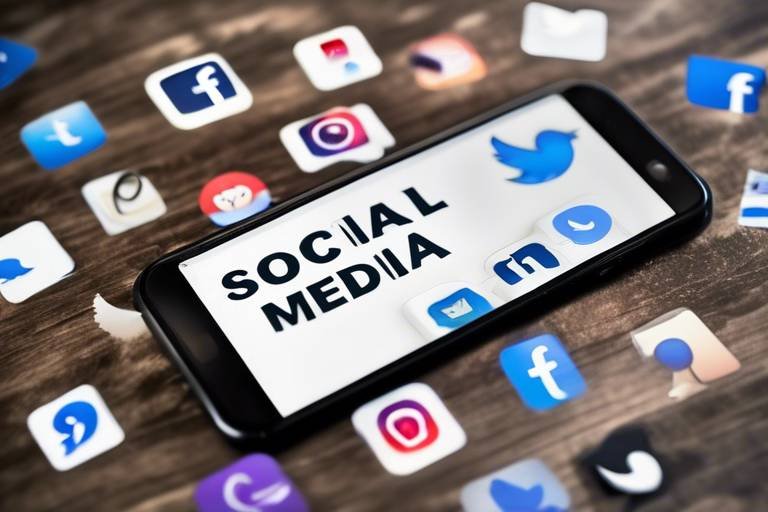Privacy Concerns with Social Media - What You Need to Know
In today's digital age, social media platforms have become a vital aspect of our daily lives. From sharing our thoughts and experiences to connecting with friends and family, these platforms offer a plethora of benefits. However, beneath this shiny surface lies a murky world of privacy concerns that every user should be aware of. The question is, how much do we really know about the implications of sharing our personal information online? As we dive deeper into this topic, we'll uncover the various privacy issues associated with social media, including data security, user consent, and the potential consequences of oversharing.
Understanding and managing privacy settings is crucial for safeguarding personal information on social media. Many users often overlook these settings, thinking that default options are sufficient. However, this assumption can lead to unintended exposure of sensitive data. By taking a few moments to adjust your privacy settings, you can significantly enhance your online security. For instance, consider who can see your posts, who can send you friend requests, and whether your profile is visible to the public. Each of these settings plays a vital role in controlling your digital footprint. Remember, your online presence is like a digital garden; if you don’t tend to it, weeds (or privacy breaches) can easily take root.
Social media platforms often collect vast amounts of user data, and the methods used for data collection can be quite surprising. Every post, like, share, and even the time spent on a particular page contributes to a larger profile that companies use for targeted advertising and other purposes. Have you ever wondered why you see ads for products you just talked about? That’s not a coincidence. The algorithms behind these platforms are designed to gather and analyze user behavior, creating a detailed picture of your interests and habits. While this can enhance user experience, it poses significant risks. If this data falls into the wrong hands, it can lead to identity theft or other malicious activities.
Many users are unaware of the extent of data collection practices. It’s alarming how often we click “I agree” without reading the fine print. This segment highlights the importance of user consent and the need for greater awareness regarding data sharing policies. Social media companies often bury their privacy policies in lengthy documents filled with legal jargon. As a user, it’s imperative to take the time to understand what you’re consenting to. After all, your personal information is valuable, and you wouldn’t hand over your house keys without knowing who you’re giving them to, would you?
Data breaches can have severe consequences for users. Notable breaches in social media history serve as stark reminders of the vulnerabilities inherent in these platforms. For example, the infamous Facebook-Cambridge Analytica scandal revealed how millions of users’ data was harvested without consent, leading to a significant erosion of trust. Such incidents not only affect individual users but also shake the very foundation of the platforms themselves. When trust is broken, users become wary, and the once vibrant community can turn into a ghost town.
Strategies for safeguarding personal information on social media are essential in this digital landscape. Here are some practical tips to enhance your online security and privacy:
- Limit Personal Information: Share only what’s necessary. The less you share, the less there is to expose.
- Use Strong Passwords: Create complex passwords and change them regularly to keep your accounts secure.
- Be Wary of Friend Requests: Only accept requests from people you know to avoid potential scams.
- Regularly Review Privacy Settings: Make it a habit to check and update your privacy settings often.
Various laws and regulations govern data privacy on social media. Key legal frameworks, such as the General Data Protection Regulation (GDPR) in Europe, aim to protect users by enforcing strict guidelines on how companies can collect and use personal data. These regulations not only empower users with rights over their data but also impose hefty fines on companies that fail to comply. Understanding these laws can help users navigate the complex world of social media and hold companies accountable for their actions.
Third-party applications can pose additional privacy risks, often accessing user data without adequate transparency. Many users install these apps without considering the permissions they grant. Before you click “install,” take a moment to review what data the app will access. This can range from your friend list to your location data. Understanding these permissions is vital for maintaining privacy and ensuring that you’re not inadvertently sharing more than you intended.
Understanding app permissions is vital for maintaining privacy. When you download a new app, it usually requests access to various data points on your device. This could include your camera, microphone, and even your contacts. Always ask yourself: Is this access necessary for the app’s functionality? If not, consider declining the permission or looking for alternatives that respect your privacy.
Sharing information publicly on social media can lead to privacy violations. While it might feel great to share your life’s highlights with the world, it’s essential to consider the potential risks involved. Public posts are accessible to anyone, including potential stalkers or identity thieves. To manage your public visibility, think twice before sharing sensitive information or location details. Remember, once something is online, it can be nearly impossible to take back.
Q1: How can I make my social media accounts more private?
A1: Regularly review and adjust your privacy settings, limit the information you share, and be cautious about friend requests.
Q2: What should I do if I suspect my account has been hacked?
A2: Change your password immediately, enable two-factor authentication, and monitor your account for any suspicious activity.
Q3: Are third-party apps safe to use?
A3: Not all third-party apps are safe. Always review the permissions they request and consider whether the app is necessary for your needs.
Q4: What are the penalties for companies that violate data privacy laws?
A4: Companies can face significant fines and legal repercussions for failing to comply with data privacy regulations.

The Importance of Privacy Settings
In today's digital age, where social media platforms are an integral part of our lives, understanding and managing privacy settings is not just a recommendation—it's a necessity. Imagine you have a beautiful garden that you cherish, but you leave the gate wide open for anyone to stroll in. That’s what it feels like when you neglect your privacy settings on social media. Your personal information, like your thoughts, photos, and even your location, is just sitting there, vulnerable to prying eyes.
Privacy settings serve as your digital gatekeepers, allowing you to control who sees what. Most social media platforms provide a range of options to customize your privacy, but the challenge lies in knowing how to navigate these settings effectively. For example, you might want to share your vacation photos with friends but not with your boss or distant relatives. With the right settings, you can create a tailored experience that keeps your information safe while still allowing you to connect with others.
To enhance your privacy, here are some key areas to focus on:
- Profile Visibility: Control who can view your profile. Most platforms allow you to set your profile to 'private,' ensuring that only friends or approved followers can see your content.
- Post Visibility: Adjust the audience for each post. You can choose to share with 'Friends,' 'Friends except...' or even create custom lists to manage who sees what.
- Location Sharing: Disable location services to prevent your posts from revealing where you are at any given moment. This is particularly important for safety reasons.
- Tagging Options: Manage who can tag you in photos or posts. This prevents unwanted photos from appearing on your profile.
Moreover, it's essential to regularly review and update your privacy settings. Social media platforms often change their privacy policies, and new features are introduced frequently. What was once a secure setting may no longer be adequate. By staying informed and proactive, you can ensure that your personal information remains protected.
In conclusion, taking the time to understand and adjust your privacy settings is akin to putting up a sturdy fence around your garden. It may require some effort, but the peace of mind that comes with knowing your personal information is secure is invaluable. Remember, it's your data—take control of it!

Data Collection Practices
In today's digital age, social media platforms have become integral to our daily lives, connecting us with friends, family, and even strangers across the globe. However, this connectivity comes at a cost: our personal data. Social media companies are notorious for their extensive , which often go unnoticed by users. They gather a plethora of information ranging from our basic profile details to our browsing habits, interests, and even our location. But how do they do this, and what are the implications for our privacy?
One of the primary methods used for data collection is through user interactions. Every time you like, comment, or share a post, social media algorithms track these activities to build a detailed profile of your preferences and behaviors. This data is then used to tailor advertisements and content specifically for you, creating a personalized experience. While this may seem convenient, it raises significant privacy concerns. Are we aware of just how much of our information is being collected and utilized?
Moreover, social media platforms often employ cookies and tracking pixels to follow users across different websites. These tools help in gathering data about your online activities, including the sites you visit and the products you view. It's like having a digital footprint that follows you everywhere you go online. For instance, if you've ever browsed for shoes on one site and suddenly see ads for them on your social media feed, that's no coincidence. This is a direct result of data collection practices at work, and while it can enhance user experience, it also poses risks to our privacy.
Another notable aspect of data collection is the use of third-party applications. Many users link their social media accounts to various apps for convenience, but this often means granting those apps access to personal information. These applications can collect data such as your friend list, posts, and even messages, leading to potential misuse of your information. It's crucial to be aware of what you are sharing and with whom. Always remember to check the permissions you grant to these apps, as they may not always have your best interests in mind.
To illustrate the extent of data collection, consider the following table that summarizes the types of data commonly collected by social media platforms:
| Type of Data | Description |
|---|---|
| Profile Information | Name, email address, phone number, and other personal details provided during registration. |
| User Activity | Posts, likes, shares, comments, and interactions with other users. |
| Location Data | Geographical information obtained through check-ins, tagged photos, and GPS data. |
| Browsing Habits | Websites visited, products viewed, and time spent on various pages. |
In conclusion, while social media platforms offer us a way to connect and share, it's essential to remain vigilant about how our data is being collected and used. By understanding these , we can make more informed decisions about our online presence and take steps to protect our privacy. After all, in a world where data is the new gold, safeguarding our personal information is more critical than ever.
- What types of data do social media platforms collect? Social media platforms collect profile information, user activity, location data, and browsing habits.
- How can I protect my data on social media? Adjust your privacy settings, review app permissions, and be cautious about what you share publicly.
- Are third-party apps safe to use with social media accounts? Not always. It's crucial to review the permissions you grant to these apps and only use trusted ones.

User Consent and Awareness
In today’s digital landscape, understanding user consent and awareness is more crucial than ever. Have you ever clicked "I agree" on a terms of service page without reading it? You're not alone! Many users overlook the fine print, which often contains vital information about how their data will be used. This lack of awareness can lead to significant privacy risks. Social media platforms are notorious for their complex privacy policies that can leave users feeling overwhelmed and confused. It's essential to recognize that user consent is not just a formality; it’s a critical aspect of protecting your personal information.
When you sign up for a social media account, you are often asked to provide various details, including your email address, phone number, and even your location. But how many of us stop to think about what happens to that data? Many platforms utilize this information for targeted advertising, which can feel invasive. The reality is that users need to be more vigilant about what they share and how their information is utilized. Understanding the implications of consent can empower users to take control of their digital footprint.
To enhance awareness, it’s vital to educate yourself about the following key points regarding user consent:
- Read Privacy Policies: Before signing up, take a moment to read the privacy policies. They outline how your data will be used and shared.
- Opt-In vs. Opt-Out: Be aware of whether you’re opting in to data sharing or if you need to opt-out. Many platforms automatically enroll users in data collection.
- Regularly Review Settings: Social media settings can change over time. Regularly check your privacy settings to ensure they align with your preferences.
Moreover, the responsibility does not solely lie with the users. Social media companies must be transparent about their data collection practices. They should ensure that users are informed and can make educated decisions about their consent. This transparency can build trust and foster a safer online environment. Unfortunately, many platforms still fall short, leaving users in the dark about how their information is being handled.
In conclusion, user consent and awareness are pivotal in today’s social media landscape. By taking the time to understand what you agree to, you can significantly reduce your risk of privacy violations. Remember, your data is valuable—treat it as such! Being proactive about your online presence not only protects you but also encourages better practices among social media companies.
- What should I look for in a privacy policy?
Look for sections that explain how your data is collected, used, and shared. Transparency is key. - How can I manage my consent on social media?
Regularly review your privacy settings and opt-out of data sharing options whenever possible. - Are there tools to help me understand my privacy?
Yes, there are browser extensions and apps designed to help users manage their privacy settings across platforms.

When it comes to social media, the phrase "data breach" can send a chill down anyone's spine. Imagine waking up one day to find that your personal information—your photos, messages, and even your private thoughts—has been exposed to the world. The impact of data breaches on social media platforms is profound and multifaceted, affecting not just individual users but also the companies behind these platforms. In recent years, we've witnessed several high-profile breaches that have left users questioning their safety online.
One of the most alarming aspects of data breaches is the loss of trust. Users expect social media companies to protect their data, and when they fail to do so, it can lead to a significant erosion of trust. For instance, consider the infamous Facebook-Cambridge Analytica scandal, where personal data from millions of users was harvested without consent. This incident not only shook user confidence but also sparked widespread outrage and led to calls for stricter regulations. Trust, once broken, is hard to rebuild.
Moreover, the repercussions of a data breach can be long-lasting. Victims of breaches often face identity theft, financial fraud, and unsolicited marketing. The emotional toll can also be significant—imagine the anxiety of knowing that your personal information is out there, potentially in the hands of malicious actors. According to a study by the Ponemon Institute, the average cost of a data breach for a company can exceed $3.86 million. This figure doesn't just represent lost revenue; it encompasses the costs of legal fees, customer compensation, and the long-term damage to brand reputation.
To illustrate the impact further, let's take a look at a few notable data breaches in the social media landscape:
| Platform | Year | Users Affected | Consequences |
|---|---|---|---|
| 2019 | 540 million | Data exposed included passwords and personal information; led to major lawsuits. | |
| 2020 | 130 | High-profile accounts hacked; sensitive information accessed. | |
| 2012 | 117 million | Passwords leaked; users urged to change passwords immediately. |
As we can see, the scale of these breaches is staggering, and the consequences are not limited to immediate financial losses. Companies face regulatory scrutiny, potential fines, and a damaged reputation. For users, the aftermath can be a chaotic scramble to secure their accounts and protect their identities.
In this digital age, it's crucial to stay informed about the risks associated with social media. While we enjoy the benefits of connectivity and sharing, we must also be vigilant about our privacy. Understanding the impact of data breaches is the first step in taking control of your online presence. By being proactive—like using strong passwords, enabling two-factor authentication, and regularly reviewing privacy settings—you can help safeguard your personal information and mitigate the risks associated with social media.
- What should I do if my data is compromised? If you suspect a breach, change your passwords immediately and monitor your accounts for unusual activity.
- How can I protect my information on social media? Regularly update your privacy settings, be cautious about what you share, and use strong, unique passwords.
- Are all social media platforms equally at risk? While all platforms face risks, the level of security and data protection measures can vary significantly.

Protecting Your Personal Information
In today’s digital landscape, protecting your personal information on social media is not just a good practice; it’s a necessity. With the increasing number of data breaches and privacy violations, users must take proactive steps to shield their sensitive data. Think of your personal information as a treasure chest; would you leave it unlocked for anyone to rummage through? Absolutely not! So, why would you leave your online presence unguarded?
One of the most effective ways to protect your personal information is by regularly reviewing and adjusting your privacy settings on all social media platforms. Each platform has its own set of privacy controls, and understanding how to navigate these settings can significantly enhance your security. For example, you can limit who can see your posts, restrict friend requests, and even manage who can look you up using your email address or phone number. It's like having a personal bouncer for your online life!
Moreover, be cautious about the information you share publicly. While it may be tempting to share every detail of your life, consider the implications. Think of your posts as a public billboard; once it's out there, it’s nearly impossible to take back. Avoid sharing sensitive information such as your home address, phone number, or any financial details. When in doubt, ask yourself: “Would I want a stranger to know this?” If the answer is no, then don’t post it!
Another crucial aspect of protecting your personal information is being mindful of third-party applications. Many users unknowingly grant these apps access to their social media accounts, which can lead to unintended data sharing. Before installing any app, take a moment to review the permissions it requests. Are they asking for access to your friends list or personal messages? If so, think twice. The table below outlines common permissions that apps may request and their potential implications:
| Permission | Implication |
|---|---|
| Access to Friends List | Can see and interact with your friends, potentially sharing their data as well. |
| Read Personal Messages | Gives the app access to your private conversations, risking your privacy. |
| Post on Your Behalf | Allows the app to post content without your consent, which could misrepresent you. |
Lastly, consider using strong, unique passwords for each of your social media accounts. A weak password is like leaving the front door of your home wide open. Use a mix of letters, numbers, and symbols to create a password that’s hard to guess. Additionally, enabling two-factor authentication adds an extra layer of security, making it more challenging for unauthorized users to access your accounts.
By taking these steps—reviewing privacy settings, being cautious about what you share, scrutinizing app permissions, and using strong passwords—you can significantly enhance your personal information's security on social media. Remember, the more effort you put into protecting your data, the safer you’ll be in the vast digital world.
- What should I do if I suspect my account has been hacked? Change your password immediately and enable two-factor authentication. Review recent activity for any unauthorized actions.
- Are there any apps that can help me manage my privacy? Yes, several apps can help you manage privacy settings across multiple social media platforms, making it easier to stay secure.
- How often should I update my privacy settings? It's a good idea to review your privacy settings at least once every few months or whenever a new feature is introduced.

Legal Regulations and Policies
When it comes to social media, the landscape of legal regulations and policies can often feel like a tangled web. As users, we are constantly sharing snippets of our lives online, but how much do we really know about the laws that protect our data? Various regulations have been enacted globally to safeguard personal information and ensure that social media companies are held accountable for their data practices. Understanding these laws is essential for anyone who wants to navigate the digital world safely.
One of the most significant pieces of legislation is the General Data Protection Regulation (GDPR), which was implemented in the European Union in 2018. This regulation has set a high standard for data privacy, requiring companies to obtain explicit consent from users before collecting their data. It also grants individuals the right to access their data, request corrections, and even demand deletion. This means that if you’re in the EU, you have more control over your personal information than ever before. However, the GDPR's reach extends beyond Europe, affecting any company that processes the data of EU residents.
In the United States, the legal framework is a bit more fragmented. While there is no single federal law governing data privacy, various state laws, such as the California Consumer Privacy Act (CCPA), aim to provide similar protections. The CCPA empowers California residents to know what personal data is being collected about them and gives them the option to opt-out of the sale of their information. As more states consider similar laws, the landscape of data privacy in the U.S. is evolving rapidly. This patchwork of regulations can make it challenging for users to understand their rights and for companies to comply.
| Regulation | Region | Key Features |
|---|---|---|
| GDPR | European Union | Explicit consent, right to access, right to be forgotten |
| CCPA | California, USA | Right to know, right to delete, opt-out of data sale |
Moreover, social media platforms must also comply with various industry-specific regulations, such as the Health Insurance Portability and Accountability Act (HIPAA) for healthcare-related data or the Children's Online Privacy Protection Act (COPPA), which protects the privacy of children under 13. These regulations emphasize the need for companies to implement robust privacy policies and practices to protect sensitive information.
However, despite these regulations, many users remain unaware of their rights. This lack of awareness can lead to a false sense of security, making it crucial for individuals to educate themselves about the legal protections available to them. It’s not just about knowing the laws; understanding how they apply to your specific situation is equally important. For instance, have you ever thought about what happens to your data when you delete an account? Many users don’t realize that some data may still be retained by the platform, raising further concerns about data ownership and control.
In conclusion, while legal regulations and policies provide a framework for protecting user privacy on social media, it’s essential for users to stay informed and proactive. By understanding your rights and the laws that govern your data, you can make more informed decisions about what you share online. Remember, the digital world is ever-evolving, and staying updated on these regulations is key to safeguarding your personal information.
- What is GDPR?
The General Data Protection Regulation is a comprehensive data protection law in the EU that enhances individuals' control over their personal data.
- How does CCPA differ from GDPR?
While both laws aim to protect consumer privacy, CCPA is more focused on the rights of California residents, whereas GDPR applies to all EU citizens.
- What should I do if my data is breached?
If you suspect a data breach, immediately change your passwords and monitor your accounts for unusual activity.

The Role of Third-Party Apps
In today’s digital landscape, third-party applications have become an integral part of our social media experience. These apps offer a plethora of functionalities, from enhancing user engagement to providing analytics, but they also come with a significant caveat: privacy risks. When you connect your social media account to a third-party app, you are essentially opening a door to your personal data. This can include everything from your profile information to your social interactions. It’s a bit like inviting a stranger into your home; you must be cautious about what you share and with whom.
One of the most alarming aspects of third-party apps is their ability to access vast amounts of user data without the user fully understanding the implications. Many users click “Allow” without reading the fine print, which can lead to unintended consequences. For instance, when you authorize an app, it might gain access not only to your personal information but also to your friends' data, which can create a chain reaction of privacy violations. This is particularly concerning when it comes to apps that may not have robust security measures in place.
To put it into perspective, consider the following table that highlights some common permissions requested by third-party apps and what they might mean for your privacy:
| Permission Type | Description | Privacy Implications |
|---|---|---|
| Access to Friends List | Allows the app to see your friends' profiles. | Your friends' data may be exposed without their consent. |
| Post on Your Behalf | Enables the app to publish content to your profile. | Risk of unwanted or inappropriate content being shared. |
| Location Access | Gives the app access to your location data. | Potential for stalking or unwanted tracking. |
So, how can you protect yourself from potential privacy breaches caused by these third-party applications? First and foremost, it’s essential to review app permissions before installation. Always ask yourself: do you really need this app? Is the functionality it offers worth the risk? Additionally, regularly check the permissions of apps you’ve already authorized. If you find that an app has access to more information than you’re comfortable with, don’t hesitate to revoke those permissions.
Moreover, it’s wise to limit the number of third-party apps you connect to your social media accounts. The more apps you have linked, the greater the risk of data leaks. Think of it as decluttering your digital life; the fewer connections you have, the easier it is to manage your privacy. Ultimately, while third-party apps can enhance your social media experience, it’s crucial to remain vigilant and informed about the data you are sharing.

Evaluating App Permissions
When it comes to social media, third-party applications can often feel like that friendly neighbor who just wants to borrow a cup of sugar. However, what many users fail to realize is that these apps may also be looking to take more than just a sweetener from your digital pantry. Evaluating app permissions is crucial to ensuring that your personal information remains safeguarded. Just like you wouldn't let a stranger rummage through your home, you shouldn't allow apps to access more data than necessary.
Before you hit that install button, take a moment to review what permissions the app is requesting. Most apps will ask for access to your location, contacts, photos, and even your social media posts. But do you really need to give an app access to your entire contact list just to use a photo editor? It's essential to ask yourself these questions:
- What data is the app asking for?
- Is this information necessary for the app to function?
- How will the app use my data?
To make this process easier, consider creating a checklist for evaluating app permissions. This can help you quickly assess whether an app is worth the risk. Here’s a simple table to illustrate the types of permissions you might encounter:
| Permission Type | Purpose | Consideration |
|---|---|---|
| Location Access | Used for location-based services | Necessary for navigation apps, but not for games |
| Contacts Access | To connect with friends | Only if the app is a social platform |
| Camera Access | To take photos or videos | Required for photo-sharing apps |
| Storage Access | To save files and media | Check if the app genuinely needs this |
After evaluating the permissions, it’s wise to adjust them according to your comfort level. Most social media platforms allow you to customize app permissions even after installation. This is where you can tighten the reins and ensure that apps only have access to the data they truly need. Remember: Just because an app is popular doesn't mean it’s safe. Always prioritize your privacy over convenience.
In conclusion, evaluating app permissions is not just a precaution; it's a necessity in our increasingly digital world. By being vigilant and proactive, you can enjoy the benefits of social media without compromising your personal information. So, next time you download an app, take a moment to scrutinize those permissions. Your future self will thank you!
Q1: How can I check the permissions of an app after it’s been installed?
A1: You can usually find app permissions in your device settings under the app management section. Here, you can view and adjust what permissions each app has.
Q2: What should I do if an app is asking for too many permissions?
A2: If an app requests more permissions than necessary, consider uninstalling it and looking for alternatives that prioritize user privacy.
Q3: Are there any apps that are safer to use than others?
A3: Generally, well-known apps from reputable developers tend to have better privacy practices. Always read reviews and check the app’s privacy policy before downloading.

Risks of Public Sharing
In this digital age, sharing personal experiences online has become second nature for many of us. However, the risks associated with public sharing on social media can be quite alarming. When you post something publicly, you are not just sharing it with your friends; you are potentially opening the floodgates to a much larger audience than you might anticipate. Imagine standing on a stage in front of thousands of people, broadcasting your most personal thoughts and moments. That’s what public sharing can feel like!
One of the most significant risks of public sharing is the loss of control over your personal information. Once you hit that “post” button, you can’t take it back. Even if you delete the post later, there’s no guarantee that someone hasn’t already seen it or even saved it. This loss of control can lead to unwanted attention, harassment, or even identity theft. For instance, consider a situation where you share your location in real-time. This could inadvertently alert strangers to your whereabouts, making you vulnerable to potential threats.
Moreover, public posts can have long-lasting implications for your personal and professional life. Employers often conduct social media checks during the hiring process, and a seemingly innocent post can tarnish your reputation. It’s like sending a message in a bottle; you might think it’s harmless, but it could wash up on the wrong shore. Many people have faced dire consequences because of what they shared publicly, leading to job loss or damaged relationships.
In addition to personal risks, public sharing can also contribute to a culture of oversharing. When we see others posting intimate details about their lives, it can create a false sense of normalcy, encouraging us to do the same. This can lead to a cycle where everyone feels pressured to share more and more, often at the expense of their privacy. It’s crucial to remember that not everything needs to be shared with the world. Sometimes, less is more!
To mitigate these risks, it’s essential to be aware of your audience and the implications of your posts. Here are some tips to keep in mind:
- Think Before You Post: Always ask yourself, “Would I be okay with this being seen by anyone?”
- Adjust Your Privacy Settings: Make sure your profile settings are configured to limit who can see your posts.
- Limit Personal Information: Avoid sharing sensitive information such as your address, phone number, or financial details.
Ultimately, while social media is a fantastic tool for connection and self-expression, it’s vital to recognize the potential risks of public sharing. By being mindful of what you share and who can see it, you can protect your privacy and maintain a healthy boundary between your online and offline lives. Remember, your digital footprint is permanent, so tread carefully!
- What should I avoid sharing on social media? It's best to avoid sharing sensitive personal information, such as your home address, phone number, or financial details.
- How can I protect my privacy on social media? Regularly review and adjust your privacy settings, limit the audience for your posts, and think carefully before sharing any personal information.
- What are the consequences of oversharing? Oversharing can lead to unwanted attention, damage to your reputation, and even issues in your personal and professional life.
Frequently Asked Questions
-
What are the main privacy concerns with social media?
Privacy concerns on social media often revolve around data security, user consent, and the implications of sharing personal information. Users frequently worry about how their data is collected, stored, and potentially misused by third parties.
-
How can I adjust my privacy settings on social media?
To enhance your privacy, it's essential to navigate to the settings section of your social media account. From there, you can customize who sees your posts, manage friend requests, and limit data sharing with third-party apps. Always review these settings regularly to stay updated on any changes.
-
What types of data do social media platforms collect?
Social media platforms collect a variety of data, including personal information (like your name and email), location data, browsing habits, and interactions with other users. This data is often used for targeted advertising and improving user experience.
-
Do I need to give consent for data collection?
Yes, most social media platforms require user consent for data collection, typically outlined in their privacy policies. However, many users may not fully understand what they are consenting to, which highlights the need for greater awareness and scrutiny of these policies.
-
What are the consequences of data breaches on social media?
Data breaches can lead to severe consequences, including identity theft, loss of personal information, and a significant decline in user trust towards the platform. Notable breaches have shown how vulnerable user data can be, underscoring the importance of robust security measures.
-
How can I protect my personal information on social media?
To safeguard your personal information, consider using strong passwords, enabling two-factor authentication, and being selective about what you share publicly. Regularly reviewing your privacy settings and being cautious about friend requests can also help protect your data.
-
What legal regulations protect my privacy on social media?
Various laws, such as the General Data Protection Regulation (GDPR) in Europe and the California Consumer Privacy Act (CCPA) in the U.S., aim to protect user privacy on social media. These regulations require platforms to be transparent about data collection practices and give users more control over their information.
-
Are third-party apps safe to use with social media?
While many third-party apps can enhance your social media experience, they may pose additional privacy risks. It's crucial to review the permissions these apps request and only grant access to the information that is absolutely necessary.
-
How can I evaluate app permissions on social media?
To evaluate app permissions, go to the settings of your social media account and find the section for authorized apps. Here, you can see what data each app can access and revoke permissions for any app you no longer trust or use.
-
What are the risks of sharing information publicly on social media?
Sharing information publicly can lead to privacy violations, such as unwanted attention, harassment, or even identity theft. It's important to consider the potential consequences of your posts and adjust your audience settings accordingly to minimize risks.



















